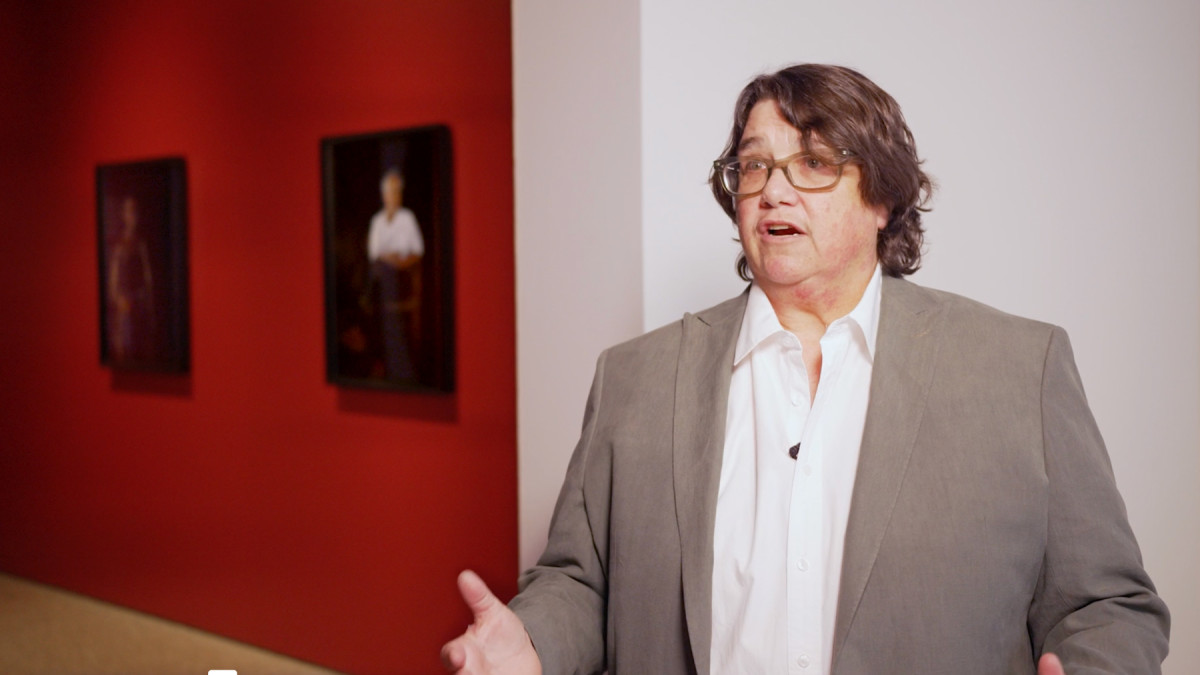American Flag (Scratch)
1999 - Photography (Photography)
Collier Schorr
Collier Schorr’s prints upend conventions of portrait photography by challenging what it means to “document” a subject. American Flag (Scratch) (1999), for example, depicts an unidentified male subject clad in an American flag-print singlet. With his head and extremities out of frame, the camera focuses on his flush-red torso, his left nipple protruding from the singlet’s strap. A horizontal scratch cuts across his right pectoral muscle, bleeding at its end and nearly dripping on the uppermost stripe of the flag print fabric. The scene’s context is ambiguous, and it is never clear if Schorr’s subject is entering a match or leaving it. By stripping the image of those anterior narratives, Schorr allows the viewer to fully revel in the image’s strange juxtapositions – of bloody injuries and healthy bodies, of patriotic symbols and exposed nipples – without resorting to narrative explication or symbolic interpretation.
Collier Schorr photographs communities of people, from high school wresters in her native New York to teenagers in the German countryside clad in American military uniforms. Her work displays an almost anthropological curiosity, and in documenting her subjects, she tries to find the idiosyncratic details through which people organize into “tribal” relationships with one another. Her images, by extension, blend photographic realism with elements of fiction and fantasy as a means of representing the various ways these tribes identify themselves. Schoor’s work also investigates gender and the ways in which subjects use visual cues and embodied signs to both inhabit and subvert assumed gender expectations.
Colors:
Related artist(s) to: Collier Schorr » Catherine Opie, » Jens Hoffmann, » Larry Clark, » Glenn Ligon, » Hank Willis Thomas, » Hiroshi Sugimoto, » Walead Beshty, » Abraham Cruzvillegas, » Adriana Varejão, » Adriano Pedrosa

© » KADIST
Walead Beshty
2012Constructed out of metal or glass to mirror the size of FedEx shipping boxes, and to fit securely inside, Walead Beshty’s FedEx works are then shipped, accruing cracks, chips, scrapes, and bruises along the way to their destination...

© » KADIST
Hank Willis Thomas
2014South Africa Righteous Space by Hank Willis Thomas is concerned with history and identity, with the way race and ‘blackness’ has not only been informed but deliberately shaped and constructed by various forces – first through colonialism and slavery, and more recently through mass media and advertising – and reminds us of the financial and economic stakes that have always been involved in representations of race....

© » ROYAL ACADEMY
Catherine Opie
Video: Catherine Opie on photographing leading British artists | Blog | Royal Academy of Arts Catherine Opie in the RA Collection Gallery Video: Catherine Opie on photographing leading British artists Read more Become a Friend Video: Catherine Opie on photographing leading British artists Published 8 September 2023 Catherine Opie discusses her portraits of David Hockney, Anish Kapoor, Gillian Wearing, Isaac Julien and Lynette Yiadom-Boakye, featured in our free display in the Collection Gallery...

© » KADIST
Walead Beshty
2010Black Curl (CMY/Five Magnet: Irvine, California, March 25, 2010, Fujicolor Cyrstal Archive Super Type C, EM No 165-021, 05910) is a visually compelling photogram...

© » KADIST
Hank Willis Thomas
2012Like many of his other sculptural works, the source of I am the Greatest is actually a historical photograph of an identical button pin from the 1960s...

© » KADIST
Catherine Opie
1987In this work, a woman sits on a couch with her shirt pulled up to expose her pierced nipples, which are connected by a chain...

© » KADIST
Catherine Opie
1987Catherine Opie’s candid photograph Cathy (bed Self-portrait) (1987) shows the artist atop a bed wearing a negligee and a dildo; the latter is attached to a whip that she holds in her teeth...

© » KADIST
Hank Willis Thomas
2013The image is borrowed from protests during Civil Rights where African Americans in the south would carry signs with the same message to assert their rights against segregation and racism...

© » KADIST
Hank Willis Thomas
2012Bread and Roses takes its name from a phrase famously used on picket signs and immortalized by the poet James Oppenheim in 1911...

© » KADIST
Abraham Cruzvillegas
2004Wright Imperial Hotel (2004) is a sort of bow and arrow made out of feathers, a São Paulo phone book, and other materials...

© » KADIST
Hank Willis Thomas
2012Intentionally Left Blanc alludes to the technical process of its own (non)production; a procedure known as retro-reflective screen printing in which the image is only fully brought to life through its exposure to flash lighting...

© » KADIST
Hank Willis Thomas
2012Thomas’ lenticular text-based works require viewers to shift positions as they view them in order to fully absorb their content...

© » KADIST
Catherine Opie
1994Although best known as a provocateur and portraitist, Opie also photographs landscapes, cityscapes, and architecture...

© » KADIST
Walead Beshty
2018Office Work by Walead Beshty consists of a partially deconstructed desktop monitor screen, cleanly speared through its center onto a metal pole...

© » KADIST
Walead Beshty
2011Constructed out of metal or glass to mirror the size of FedEx shipping boxes, and to fit securely inside, Walead Beshty’s FedEx works are then shipped, accruing cracks, chips, scrapes, and bruises along the way to their destination...

© » KADIST
Catherine Opie
1993Like many of Opie’s works, Mike and Sky presents female masculinity to defy a binary understanding of gender...




